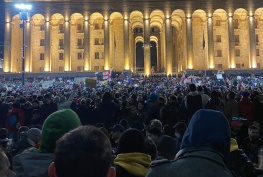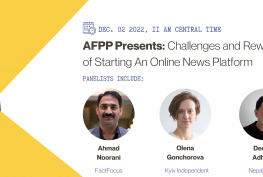By Mercy Adhiambo
In a few days, I will leave the USA and head back to my country, Kenya. My journalism fellowship at The Oklahoman has come to an end after five months of being in a place that has grown to be so close to my heart.
| This is Mercy’s final column published in The Oklahoman on Sept. 4 |
It seems like just the other day when I learned that I will be traveling to the USA — several thousand miles from home — and I immediately went into a mini panic mode. The thought of being in a place so unfamiliar filled me with such uncertainty. Even though I was excited at the idea of visiting a foreign country to learn more about journalism, it scared me to imagine being alone, trying to navigate through different cultures, perspectives and lifestyles.
Now, five months have flown past. I am battling moments infused with bittersweet feelings. On one hand, I am happy to be returning home, yet I am scared of breaking the bonds that I have established during my stay in Oklahoma City.
I came to Oklahoma a few days after my 29th birthday. For many people, that is the age of actualization. It is the age of chasing the things that they have always wanted to do, and stabilizing in a career. For most people, turning 29 is the hallmark of maturity.
At 29, many people are beginning to correct the mistakes of their teens and 20s. They are sitting still to allow the winds of growth to sway them toward the direction of organized life.
Most people I have interviewed in my career often told me that when they clocked 29, the realization that they need to straighten their lives and put themselves together hit them hard.
I once talked to a man who had just turned 29, and he told me: “At the age of 29, people must be able to choose their battles and know their worth. Twenty-nine is the age of change.”
That quote haunted me so much when I realized I am edging toward 29, yet my life was so chaotic, perhaps even more disorganized than it had been when I was in my teens and the only thing I battled with was whether my eyebrows were arched uniformly.
I came to Oklahoma when everything around me was falling apart. In fact, what most people don’t know is that I came to Oklahoma at a time when I was in the process of quitting journalism. I had worked as a freelance journalist when I was in college, and after graduation I continued before getting absorbed into the newsroom.
When I started writing, I was a fireball. I was being driven by a passion to write with every breath in my body. However, as time went by, I started feeling like the embers that once shone inside me were beginning to fizzle, to release nothing but ashes.
My journalism spirit was dying.
I no longer felt the pulse of the stories I wrote. I felt like a person yelling in a huge maze, and the only things coming back were echoes of my own voice. I felt like nobody was reading what I was writing.
That, coupled with the fact that journalism in Kenya is one of the professions that does not pay well, gave my spirit and self-esteem a beating I felt I could no longer take.
I was tired of penning intros about my age mates who were doing things that I wanted to do. Every night that I sat to file stories on other people moving forward, a piece of me died. I was stagnated in words that were slowly losing meaning. I felt like it was a nudge to move to other things. The conviction got even stronger when I invested my time and energy to develop a story only for it to not see the light of day because it touched on someone who “cannot be written about.”
I was sinking into that zone where everything else ceases to make sense. Waking up in the morning made me tired. The journalism thrill was gone. I was an empty shell, praying to get an escape.
Then the fellowship and an opportunity to come to America to do something different happened, and my life took the proverbial shift.
When I learned that I had been chosen to participate in the Alfred Friendly Press Partners fellowship, I immediately got excited about what being in a different setting would provide. Anything to move from the Kenyan newsroom sounded appealing.
Oklahoma gave me the best experience.
From the first story I wrote about the mental health situation in Oklahoma, I knew that I was in the right place. The reception from readers has been amazing. Not to sound vain, but I got a good welcome. I was coming from a place where I felt like I was talking to myself in a huge maze, and then Oklahomans turned it around and made me feel like I was a VIP addressing a crowd.
You made me feel like my voice mattered.
Every little story that I told, you overwhelmed me with your responses. From emails, to even recognizing me on the street and saying: “Hey, aren’t you the new girl at The Oklahoman? … I read your story.”
You blew energy into the dying fires of my journalism spirit.
I started writing with so much doubt inside me. I was scared that, coming from a developing country, my voice would get submerged among the powerful voices of journalists better than me. I was so anxious and nervous. Wondering if you will get thrown off by my fragmented thought process. I constantly worried if you will understand what I was talking about.
I was concerned about my grammar or if you will think I am annoying, with how I wind on and on about things that you think don’t matter. I obsessed about how the sentences followed each other, because I did not want you to think I am incoherent.
Then you surprised me by leaving such beautiful comments that made me realize I had blended just fine. You made me know that I will be all right here.
I have no words to describe how much I needed that reinforcement.
Every feedback I got from readers gave me the desire to continue. I have had a good time, much more than I anticipated. I am surprised by how you read and remembered the things that I wrote.
I have had strangers in Oklahoma reach out and invite me for a connection through the stories that I wrote. I have made friends who were able to open up and tell me that they read my words and found healing. When I wrote about fatherhood, many people wrote to tell me about their fathers. They talked about their experiences and related to mine.
That, to me, is what journalism is all about. To be able to find universality and familiarity in our differences.
Through writing here, I was able to meet a group of African women living in Oklahoma who invited me for a cookout and reminded me that a woman can be whatever she wants to be if she pushes the barriers placed before her.
There were times when the longing for home sneaked in and I felt like I desperately needed to go home. But those times didn’t last long, especially when people randomly wrote to me to ask me if I am OK.
I have discovered a power inside me with which I was not familiar. You did that for me, Oklahoman readers. And I don’t take it for granted.
I may not have been able to respond to every individual email, but I felt the love. I may have passed on some of the coffee invitations because of time constraints, but I will carry with me the feeling of appreciation I got when the people of Oklahoma made me feel so warm and welcome.
Not once did I ever feel lost. In fact, I leave this place with renewed energy. Every time someone told me “Your story moved me …,” it made me want to return to journalism and keep writing.
I am ready for what lies ahead. So soon, I will be sitting in my mama’s house, devouring fresh fish and telling her about my life in America. So soon, I will be in my home newsroom, typing away about the things happening in my motherland, Kenya.
A part of me wants to stay here forever. Yet I know my time is up. I have to fold up for another beginning. It has been a good stay. The memories will go with me.
In our national language, Swahili, we say “kwaheri” to mean, goodbye. But I hope someday, I will return to Oklahoma. So, I will not say “kwaheri.” It sounds too permanent. “Kwaheri” puts a scary finality to it. “Kwaheri” is a sad word.
Instead, I will use the word “baadaye!” It is Swahili for “later.”
It makes my leaving temporary. It has an air of promise on it. It means “I will see you in the near future.”
It does not give a time frame of my return, but it is better than “kwaheri.”
So, baadaye, good people. It has been a beautiful stay. And thank you for a brilliant welcome.
Mercy Adhiambo can be reached via email at mercya@presspartners.org.





